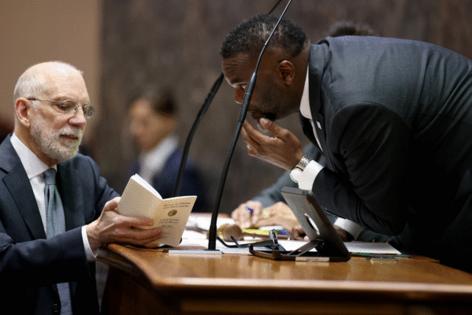Chicago City Council passes Mayor Johnson's $830 million infrastructure bond plan after pushback
Published in News & Features
CHICAGO — The Chicago City Council narrowly passed a hotly contested $830 million infrastructure bond plan Wednesday backed by Mayor Brandon Johnson.
Aldermen approved the plan in a 26-23 vote a day after Johnson’s administration proposed a version with clearer spending guardrails. While opponents decried the debt package as financially irresponsible, allies of the mayor defended it as a typical and crucial way to fund basic infrastructure work.
“We are not mortgaging the future of our children. We are building the roads that they are going to use,” 3rd Ward Ald. Pat Dowell said.
The already tense dispute over the bond sale got off to a rocky start Wednesday when Johnson initially moved ahead on a vote before aldermen had the chance to speak. The mayor reversed course moments later amid uproar from opponents. Johnson said the vote proceeded in error and halted it to allow debate “as a courtesy.”
The heated debate on display Wednesday had gained momentum over the last two weeks in a series of dueling op-eds and online jabs. In the Tribune, 34th Ward Ald. Bill Conway called the plan a way of “kicking the can into a brick wall,” while Dowell, chair of the City Council’s Finance Committee, defended it as responsible and accused opponents of “political grandstanding.”
Critics had alleged bond revenues could be used to balance the Chicago Public Schools budget, an idea Johnson repeatedly rejected. The plan he proposed Wednesday included revised language clarifying that the money will not be used for purposes other than infrastructure repairs and upgrades.
But Johnson’s opponents still took issue with the bond plan’s size and “back-loaded” repayment timeline Wednesday, echoing credit-impact concerns shared with the Tribune by municipal bond experts.
“If you find yourself in a hole, the first thing you do is stop digging,” Conway said. “We can fund important projects and invest in Chicago, but we don’t have to mortgage our children’s future and saddle them with reckless debt to do it.”
As part of the plan, the city will not make interest payments until 2027 and will not pay principal until 2045. That principal cost would then grow from $27 million to about $129 million by the debt’s 2055 due date. The total repayment cost for the bond is an estimated $2 billion.
The plan was set for a vote last week when 9th Ward Ald. Anthony Beale used a legislative maneuver to force a delay. Johnson’s team quickly scheduled another meeting to finally get it passed.
But it still faced strong headwinds Wednesday: Johnson had to cast a rare tie-breaking vote after aldermen split 25-25 as they considered a vote to push their final decision on the bond to May.
Ald. Andre Vasquez, 40th Ward, voted in support of the delay, but later joined the majority to pass the bond package. While many mayoral allies cast the debt plan as a standard city financing practice, it sparked fierce debate in part because of a broader lack of trust in Johnson, Vasquez said.
“The trust and the confidence isn’t here even to do standard operating procedure or easier lifts,” Vasquez said. “The trust isn’t there. I think the public knows it, the City Council knows it. The mayor needs to know it.”
Conway shared his own plan with aldermen Tuesday for a smaller total bond around $500 million, while 43rd Ward Ald. Timmy Knudsen proposed a substitute ordinance this week to expedite the repayment timeline and cut interest payments.
Still, Johnson stuck with his plan for the bond’s size and schedule Wednesday, even as half the council supported delaying the vote.
“The way that we’ve done debt service in the city for a long time has gotten us to where we are now,” 11th Ward Ald. Nicole Lee said. “I think it warrants additional conversation.”
Johnson’s allies said it would be far more financially irresponsible to not take on debt to improve the city’s infrastructure. The bond is a “quality of life issue” and could likely be refinanced on better terms someday, Vice Mayor Ald. Walter Burnett argued.
“Deferred maintenance would cost more,” Burnett said. “Potholes will grow bigger, vacant buildings will catch on fire, light poles will fall and bridges could deteriorate beyond repair.”
According to city finance officials, about $108 million of the bond revenues would go to “menu” projects decided by each alderman and supplemental work from the city’s Department of Transportation; another $99 million would replace or repair bridges; $157.5 million would go toward new streetscapes and safety improvements at up to 150 intersections where crashes are most common; $74 million would update city buildings, including firehouses and fire-damaged buildings; and $65 million would replace city cars, install new speed cameras and provide new gear to firefighters.
Another $100 million would help replace lead service lines and $102 million would resurface residential and arterial streets and create 50 “green” alleys to help alleviate flooding.
____
©2025 Chicago Tribune. Visit at chicagotribune.com. Distributed by Tribune Content Agency, LLC.







Comments